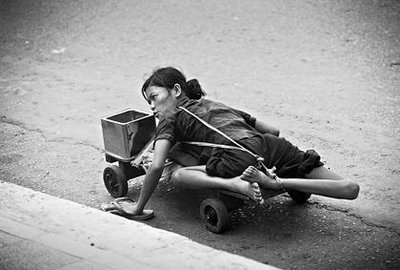US to study Agent Orange depot clean-up

Agent Orange: An Ongoing Atrocity
A review of Agent Orange: "Collateral Damage" in Vietnam by Philip Jones GriffithsTrolley Ltd. (Great Britain)Hardback, 160 pages, with 100 b/w photographs
RAW STORYPublished: Friday February 9, 2007
HANOI (AFP) - The United States have offered Vietnam cash to study the clean-up a former depot that stored Agent Orange, the wartime US chemical blamed for a range of diseases and birth defects.
HANOI (AFP) - The United States have offered Vietnam cash to study the clean-up a former depot that stored Agent Orange, the wartime US chemical blamed for a range of diseases and birth defects.
Although the United States pledged only 400,000 dollars, a fraction of what Vietnam says is needed, the move is seen as a step forward in a long-standing dispute as the former enemies look to improve relations.
"We still have a long way ahead, including in environmental remediation," said Le Ke Son, head of Office 33, which deals with the Agent Orange issue, under the Natural Resources and the Environment Ministry.
"The expenses to support Agenct Orange victims are many times higher than those for the environmental remediation," he said -- adding that the offer was nevertheless a "meaningful action and progressive step".
The United States has repeatedly refused Vietnamese demands to compensate what the communist country says are millions of victims of Agent Orange, used by the US military during the Vietnam War that ended in 1975.
Washington has denied responsibility and has pointed to an absence of universally agreed scientific data on the chemical's effects.
"We need credible scientific research, done at international standards with peer review that both sides accept, and we have not been able to achieve that," said US ambassador Michael Marine.
"Without that we do not have clarity on the scope of the problem in human health. And therefore it's difficult for us to sit down at the table and consider remediation efforts," he said.
Agent Orange, a defoliant named after the orange-striped barrels it was shipped in, was used to strip the Vietcong of jungle cover, expose their bases and supply lines, and deny them shelter and food.
It contained dioxin, a chemical that has been linked to a variety of diseases and which Vietnam has blamed for a spate of birth deformities, including babies with brain damage and shortened limbs.
During the conflict, the US military sprayed up to 80 million litres of herbicides over southern Vietnam, from the Mekong Delta to the central Demilitarised Zone, under a programme it dubbed "Operation Ranch Hand."
The US grant will be used to help fund a study on how to clean or contain contaminated soil at the airport of the central coastal city of Danang, a former US military base that has been identified as a "dioxin hotspot."
Nguyen Truong Anh, the deputy director of Danang city's water supply company, this week reiterated a warning, especially for people living near the airport, not to use ground water "because it is very polluted."
Le Ke Son said the clean-up at the airport would cost an estimated 43 million dollars.
Experts warn that Agent Orange can affect humans years after it was sprayed as the dioxin can accumulate in fruit and vegetables grown in contaminated soil, and in animals such as fish from contaminated ponds.
Veterans exposed to Agent Orange in the Vietnam War, including groups from the United States, Australia, Canada and New Zealand, have in recent years obtained compensation, officially or in out-of-court settlements.
A Vietnamese victims' group backed by the government has sued 37 American chemical companies that made the toxin, demanding compensation in a US federal court. The lawsuit was thrown out in 2005 and the group is appealing.
Other dioxin hotposts identified in past studies are in the south-central town of Phu Cat and in Bien Hoa, about 40 kilometres north of Ho Chi Minh City, formerly known as Saigon.




0 Comments:
Post a Comment
<< Home